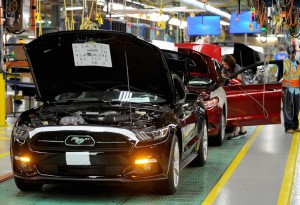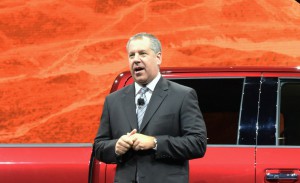
Ford is planning to use its underutilized plant in Flat Rock, Michigan, to build electric vehicles starting in 2023.
Ford Motor Co. will invest $900 million in two Detroit-area facilities meant to focus on the cars of the future.
The bulk of the investment, about $850 million, will go to Ford’s now under-utilized Flat Rock facility that will become the automaker’s second source for pure battery-electric vehicles, or BEVs, in the process creating 900 new jobs. The rest will fund what the automaker is describing as an “Autonomous Vehicle center,” where conventional vehicles will be modified to operate hands-free and even entirely without a driver.
Ford was one of the earliest of the automakers to focus on battery-based powertrain technology, though it won’t bring out its first long-range all-electric model until next year, a “Mustang-inspired” SUV expected to take aim at the new Tesla Model Y. It will be produced at Ford’s first battery-electric vehicle plant in Cuautitlan, Mexico.
Last year, Ford said it would invest $11.1 billion to fund its electrification push, with “about 40” electrified models now in various stages of planning and development, according to Joe Hinrichs, Ford’s President of Global Operations. That includes both BEVs, as well as conventional and plug-in hybrids.
(Mustang Electrified? Click Here to see how Ford stole a little bit of Tesla’s Model Y thunder.)
Wednesday’s announcement shows Ford’s research indicates growing consumer interest in all-electric models, said Hinrichs. “We were always confident there would be growth in demand for electric vehicles. As we take a closer look, we’re seeing more acceptance.”

Joe Hinrichs, Ford president of Global Operations, said the company's new Mustang-based EV will begin production in 2020.
That’s especially true among millennials, Ford research showing that “over the next five to 10 years they will be the biggest buying group in the market,” Hinrichs added.
The battery-car market, including everything from conventional hybrids to BEVs, is still small, representing less than 5% of U.S. new vehicle sales last year. But 2018 saw a marked growth, especially in China, which has enacted the strict New Energy Vehicle mandate promoting plug-based products. China is now the world’s largest market for all-electric vehicles, but the U.S. has also seen rapid growth since the launch of Tesla’s Model 3. That said, other manufacturers lag well back of the California automaker and it remains to be seen how much traction Ford’s new SUV will gain.
“Hold your horses,” Ford said in a tweet no-so-coincidentally released at precisely the same time Tesla began the webcast unveiling of its newest entry, the Model Y last week.
The automaker has provided few details about the sporty SUV it is developing but, in an exclusive interview, Hinrichs told TheDetroitBureau.com, “We haven’t given a timeline but it’s (set to go on sale) next year, 2020.”
(Click Here to learn what Ford said when it revealed the Mach 1 project last year.)
That long-range SUV will be produced at Ford’s Cuautitlan, Mexico, assembly plant, the first factory it is tooling up for all-electric vehicles. The Flat Rock, Michigan facility will go into operation by 2023 and will produce an even more advanced battery-car family, according to the Ford executive.
Exactly how much of a market there will be for battery-cars is uncertain and will almost certainly vary by market, according to research by such consulting firms as Navigant and Boston Consulting Group. The U.S. could see big growth as more millennials move into the new vehicle market. But the pace of growth also could be impacted, Hinrichs noted in a prior interview, by how the Trump administration handles an ongoing review of proposed 2025 vehicle mileage standards. A preliminary, proposed rollback would substantially reduce the need for automaker to rely on electrified drivetrain.
As big as Ford’s electrification plans are, it appears to lag some of its key competitors, at least in raw numbers. General Motors has said it hopes to have as many as 25 all-electric models on sale globally by 2025 and already offers the 238-mile Chevrolet Bolt EV, with Cadillac set to launch the next wave with a luxury electric SUV coming next year. Volkswagen, meanwhile, is targeting “50-plus” BEVS by 2025.
Ford’s Wednesday announcement also finds it preparing to open an autonomous vehicle, or AV conversion center. A study released by Navigant Research this week listed Ford’s development program as one of the industry’s most advanced. It currently runs a major development center in Silicon Valley, but last year committed to setting up a combined electrification and AV development center in Detroit’s Corktown neighborhood.
(Ranger reborn. Click Here to check out Ford’s 2019 midsize pickup.)
The next step will be the addition of a facility where conventional vehicles are modified to operate hands-free and even entirely without a driver. While the exact location of that facility isn’t being released, a statement from Ford said, “Production of Ford’s first autonomous vehicles will begin in 2021 for deployment in commercial services to move people and goods.”

